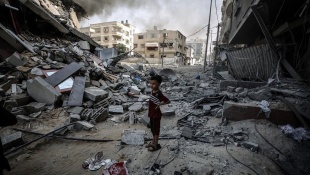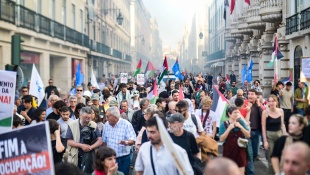The consequences of the recent escalation of violence, with countless victims among the Israeli and Palestinian populations, are deeply worrying, and this deserves the strongest repudiation and condemnation.
It is necessary to immediately stop the escalation of war in order to prevent even more tragic consequences for the Palestinian population, martyred by decades of occupation and oppression, and for the Israeli population – Arabs and Jews –, in the fight against the arbitrariness of the government of Israel.
Following the serious consequences for the populations already witnessed resulting from the recent escalation, the indiscriminate bombings, the scale of destruction, the cutting of water, food and energy supplies to the Gaza Strip are particularly worrying - worsening a blockade imposed by Israel since 2006, which led the UN to consider the conditions in this territory unfit to sustain human life – as well as the threat of Israeli forces entering, seeking to place the Palestinian population between death and expulsion from their homes.
The Portuguese Government must take a clear stand in rejecting the escalation of war and in favour of a political solution to the conflict based on international law, in compliance with UN resolutions that have for decades contemplated the creation of two States, in respect for the inalienable national rights of the Palestinian people.
75 years ago, the UN General Assembly approved a partition plan providing for the creation of two States in the historic territory of Palestine. The State of Israel has existed since 1948. The creation of the State of Palestine is yet to be fulfilled.
Throughout all these years, Israel has imposed an occupation, violating UN resolutions, such as the General Assembly Resolution 194 and Security Council Resolutions 242 and 338. It did not comply with the agreements it signed, such as the Oslo agreement. It triggered wars, aggressions, massacres of the Palestinian people, causing thousands of deaths. It bombed and occupied territories in neighbouring countries, such as the Syrian Golan Heights. It assassinated Palestinian political leaders. It imprisoned thousands of Palestinians. It imposed a cruel blockade on the Palestinian population in the Gaza Strip. It made the creation of a State of Palestine in the territories occupied in 1967 unviable, through the construction and expansion of settlements, which are illegal under UN Security Council Resolution 2334, and the construction of the Separation Wall, considered illegal by the International Court of Justice.
A policy of occupation, oppression and provocation that was significantly heightened by Netanyahu's far-right government and the action of Israeli settlers, worsening the situation and leading to an increase in confrontation and violence in Israel, Palestine and the Middle East.
The replacement of political processes, based on UN resolutions, with the brutal denial of the rights of the Palestinian people, can only lead to a worsening of the situation and tragic events. Those who turn a blind eye and leave Israel's criminal occupation policy unpunished fuel the escalation of violence and the danger of its spillover in the Middle East.
Peace will only be possible with justice for the Palestinian people, with respect for international law, with the materialisation of a political solution in compliance with the relevant UN resolutions, with an end to Israel's policy of occupation and oppression.
The Assembly of the Republic:
- Expresses its condolences for the victims of the current escalation of violence in Palestine and Israel, as well as for the tens of thousands of Palestinian, Syrian, Lebanese, Egyptian, Jordanian and Israeli victims resulting from 75 years of denial of the rights of the Palestinian people and of violations of international law by Israel;
- Affirms the need for a political solution that guarantees the materialisation of the right of the Palestinian people to a sovereign and independent State, with the 1967 borders and capital in East Jerusalem, and the implementation of the right of return of refugees, in accordance with the relevant resolutions of the UN.



